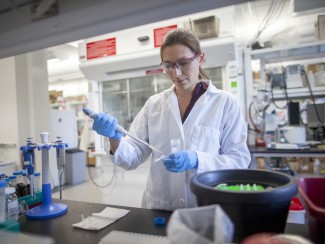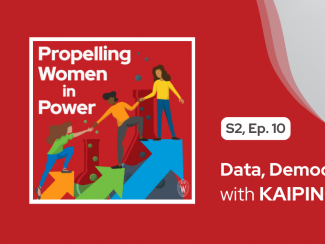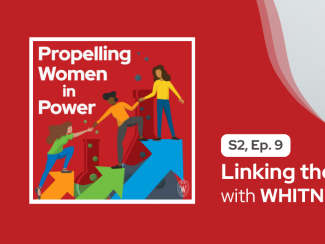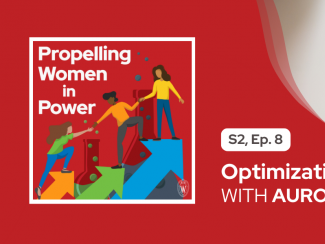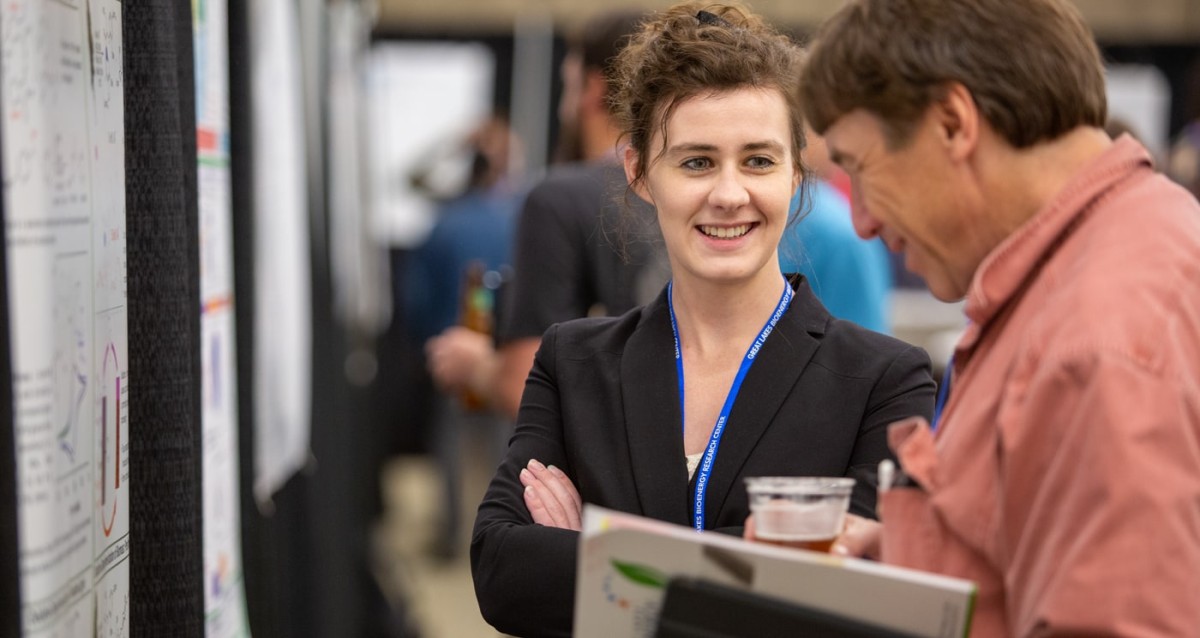
Our graduate students and postdoctoral researchers play an enormous role in the transition to a sustainable, resilient, and affordable energy future that is centered on social and economic equality. From lab experiments to field work to classrooms, these leaders of today and tomorrow are our catalysts for energy discovery.
In this series, we learn more about what inspired these talented researchers, what brought them to their field of study, and the questions that drive their work at the Wisconsin Energy Institute.
This week we spoke with Shannon Goes, a graduate student assistant in Shannon Stahl’s lab at the University of Wisconsin–Madison. Shannon is from Woodward, Iowa and studied chemistry and Spanish at Iowa State University. She is now a Ph.D. candidate studying chemistry at UW–Madison.
What brought you to UW-Madison and the Wisconsin Energy Institute?
I came to UW–Madison for graduate school because the students I met here during my visitation weekend seemed happier than any other graduate students at the universities I had visited. Stahl group members with a focus on lignin research moved to the Wisconsin Energy Institute after the COVID—19 pandemic began to better coordinate with our colleagues and collaborators at the Great Lakes Bioenergy Research Center.
What is one thing that surprised you about UW, Madison, or Wisconsin?
I was surprised by how much I love Madison in the summer! Fall is typically my favorite season, but the farmers markets, kayaking, picnicking, hiking, and sailing make summer my favorite time of the year here.
Can you tell me about your research in a way that you would describe to friends or family?
I use electricity to make organic molecules, i.e. electrochemistry. My current project focuses on using electricity to investigate new catalysts that can break down waste parts of wood, known as lignin, into valuable chemicals.
“Though my process for generating valuable chemicals from renewable wood sources is a long way from being practical on a large scale, I hope that researchers can build on my work and eventually design environmentally friendly and economically viable processes for producing chemicals from renewable sources.”
Shannon Goes
What led you to this area of research?
I decided that I wanted to learn something completely new in graduate school, so I took a graduate class on electrochemistry, which eventually led me to the organic electrosynthesis team in the Stahl group. After finishing up a project on pharmaceutical electrosynthesis, I wanted to tackle a new area of research, so I joined the lignin team. My current project is a mixture of electrochemistry and lignin research.
What do you hope to accomplish after your time at UW-Madison and the Wisconsin Energy Institute?
I want to continue with research and learning new things, and I hope to find a research position in industry or a post-doc position after graduation.
What is your favorite memory at the Wisconsin Energy Institute so far?
My favorite memory at the Wisconsin Energy Institute has been setting up the lab and offices. Many people at the Wisconsin Energy Institute and in the Stahl group helped to make the move low-stress, and organizing and optimizing a new space always fills me with positivity and excitement for the future work to be done there!
What has been the most difficult part of working as a researcher during the COVID-19 pandemic?
The most difficult part of working as a researcher during the COVID—19 pandemic has been the limited interaction with coworkers. Casual, daily discourse with colleagues improves both my science and my mental health.
On the other hand, what has been the most fun part of working as a researcher during the pandemic?
The most fun part of working as a researcher during the COVID—19 pandemic has been getting to spend a lot of time with my cat, Gidget! She snuggles up with me any time I have an online meeting or desk work to do at home.
What is one thing you have experienced that no one else you know has done?
During high school, I worked in the Iowa State Senate during the 2012 session as a page where I sat in on committee meetings, received and directed messages from the public to their senators, and ran the voting and microphone systems during floor discussion.
What do you do when you’re not working?
In the summer, I spend as much of my time outside as possible! When it’s cold, I like to read and watch movies/shows. Science fiction is one of my favorite genres.
What is one fun fact about yourself?
I took a scientific glassblowing class last year! I learned how to join pieces of glass, fix cracks in glassware, and make marbles.

